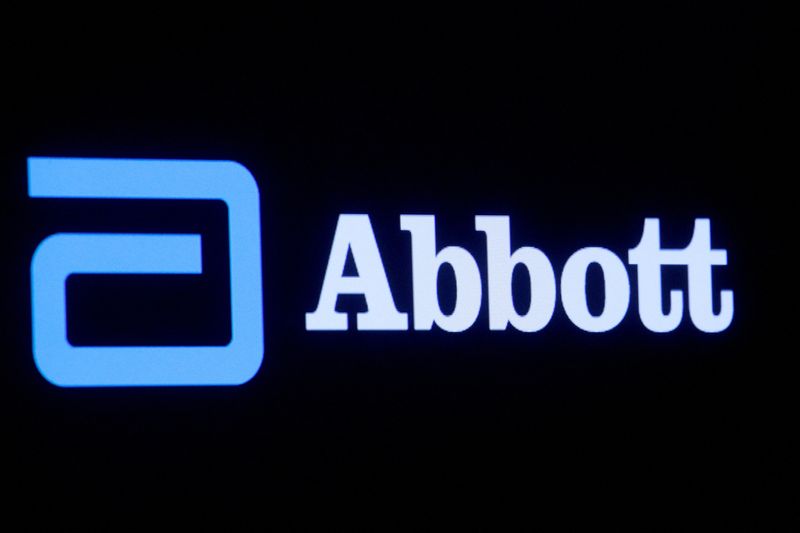By Brendan Pierson
(Reuters) - A Missouri mother and her lawyers this week will aim to convince a jury that Abbott, Reckitt's Mead Johnson and St. Louis Children's Hospital are responsible for a severe intestinal illness that she says her premature son got from the companies' formulas after he was born at the hospital.
The closely watched trial in St. Louis, Missouri state court, which begins with jury selection on Monday, is part of sprawling litigation that has already resulted in verdicts of $60 million against Reckitt and $495 million against Abbott. Close to 1,000 similar cases are still pending nationwide.
Plaintiffs argue that giving cow's milk-based formula to premature babies - especially the smallest ones, born weighing less than about 1,500 grams or about three pounds - greatly increases their risk of developing necrotizing enterocolitis (NEC). That condition has an estimated fatality rate of more than 20%. They also say the companies had a legal responsibility to warn about that risk, but failed to do so.
Both companies said in statements that the lawsuit's claims are not supported by evidence and that their products are essential for premature babies.
St. Louis Children's did not respond to a request for comment on the litigation.
Large verdicts in the two cases that have so far gone to trial have raised alarm among doctors who fear losing access to products they depend on to feed babies.
Abbott and Reckitt are the only companies selling the formulas at issue, which are specialized products used in newborn intensive care units. In a July investor call, Abbott CEO Robert Ford (NYSE:F) suggested that they might become unavailable because of the litigation. Reckitt also said it was considering "strategic options" for its formula division.
The products for premature babies are not big sellers, bringing Abbott only about $9 million and Reckitt less than $1 million annually, according to company spokespersons.
"I would say there's a genuine panic," said Jonathan Davis, who is chief of newborn medicine at Tufts Children's Hospital in Boston.
Doctors say the benefits of breast milk for premature babies on a wide range of measures – including lower rates of NEC – have been known for years, and are reflected in hospital feeding practices. But, they say, formula remains vital to feed babies when the mother's or donated breast milk is unavailable or insufficient.
"I would love if every mother could give me breast milk. They can't," said Jill Maron, chief of pediatrics at Women & Infants Hospital in Providence, Rhode Island. "If I don't have access to these products, babies will die."
'MESSAGE OF FEAR'
Tor Hoerman, a lawyer who represents the plaintiff who won the $495 million verdict and others, said doctors are responding to a "message of fear" pushed by the manufacturers, who were unnecessarily suggesting that the products might be withdrawn.
"Nobody is requesting that the product be pulled from the market," Hoerman said. Instead, he said, the companies "could put a simple warning about risk" on the formulas' labels.
At the upcoming trial, plaintiff Elizabeth Whitfield will urge the jury to find that the companies and the hospital were negligent under Missouri law. She says her son, who was born at less than 28 weeks in August 2017, developed NEC the following month as a result of being fed formula and required surgery to remove part of his intestine.
Whitfield's son, like many NEC survivors who have surgery, "continues to suffer from permanent and severe injuries," according to the lawsuit.
The lawsuit and others like it are separate from cases over allegedly contaminated formula from an Abbott factory in Michigan. There are no allegations that the premature baby formula was contaminated.
The science around NEC, breast milk and formula feeding remains unsettled.
A recent report from a U.S. National Institutes of Health working group said that current evidence "supports the hypothesis that it is the absence of human milk – rather than the exposure to formula – that is associated with an increase in the risk of NEC."
The manufacturers say that a label warning that formula can cause NEC would be unsupported. And because doctors are already aware of the research, they say, a label would not change anything.
Several neonatologists interviewed by Reuters said they worried that a warning label could make parents believe formula was unsafe even when it was the best available option.

The NEC Society, a patient-led organization devoted to fighting the disease, has said that formula is sometimes necessary and that lawsuits are not part of its strategy.
"What I would love for everyone to focus on is how we increase equitable access to mother's milk and pasteurized donor milk," said NEC Society Director Jennifer Canvasser, who founded the organization after losing her own son to the disease.